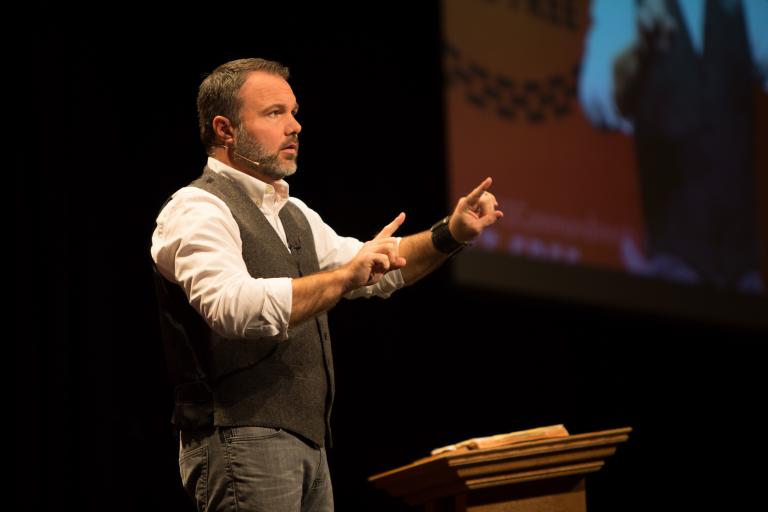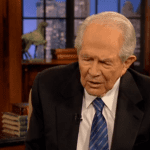
(H/T)
If you’ve followed my blog for very long, then you know there are few things that Mark Driscoll and I agree about.
I have unapologetically taken him to task for both the absurd and egregious things he all too often says and does.
But since we both confess Jesus as Lord, I think it’s only fair that I call attention to the moments when we do agree. They may be few and far between, but it seems one of those such moments came about recently.
Now, you may know that Driscoll has taken a self-imposed sabbatical from social media (for some of those aforementioned absurd and egregious acts). However, Driscoll’s church, Mars Hill, still maintains an active presence online, including weekly postings on YouTube of clips from Driscoll’s recents sermons.
According to Warren Throckmorton, a couple of weeks back Mark Driscoll preached on Acts 6:1-7 and, somehow or another (the passage isn’t directly related to this) got to talking about the difference between sin and mistakes. At which point he said,
One of the ways we learn how to do things is we don’t get it right the first time. We fail. So then we learn from it and we figure out how to do it, that’s how we do things, right? Some of you are paralyzed by religious perfectionism. I need to get it all right, I need to get it all right the first time. You’re not Jesus. And you know what? Jesus may have learn how to do things by figuring it out, maybe not always getting it 100% right the first time.
In other words, Mark Driscoll believes that Jesus may have made mistakes in his life.
Perhaps not surprisingly, the folks at Mars Hill weren’t as comfortable with that idea as Mark is and, according to Throckmorton, they deleted the six minutes of his sermon in which he talked about the possibility of Jesus having made mistakes in his life.
Though I confess I never thought I would say this, I agree with Mark Driscoll.
At least on this point.
In fact, I think he’s raising a critical point about our understanding of who Jesus was, what it means for God to be incarnated, and why the incarnation matters at all.
To put it simply, if, as Christian orthodoxy unequivocally affirms, Jesus was fully human, then Jesus committed mistakes.
Not sin.
Mistakes.
That’s a critical difference that, to his credit, Driscoll tries to emphasize.
In the most basic sense, I think sin and mistakes are differentiated by intentionality. Though, we could still sin unintentionally, particularly in the form of causing harm to others.
But there’s more to it than that.
Augustine said the root of all sin is pride. While I whole-heartedly agree, I believe the roots go even deeper.
All sin is, I believe, a form of idolatry. Like the first sin in the Garden, sin in its various forms today is an attempt to wrestle control from God. By acting counter to God’s call on our lives, we not only declare we know better than God how life should be lived, but in doing so we usurp the role of God as Lord of our lives. Whatever sin we commit – be it lying, stealing, murder, theft, or whatever – it isn’t just a violation of the law, it’s a rejection of the created order in which love of God and love of neighbor are the way of life. This is a rejection that rewrites the created order in our own image, which is why at its heart, sin is idolatry.
This is why I don’t think making a mistake is necessarily a sin (why Jesus could make a mistake without sinning), because in making a mistake we aren’t necessarily trying to wrestle control from God. We’re simply embodying our inherent imperfection as creatures who are not the Creator. And when Jesus made mistakes, he was simply incarnating his humanity – but not sinning because he was not seeking to steal control from God.
Moreover, I believe making mistakes is actually essential for life, because, as Driscoll points out, by making mistakes we learn and grow into the people we have been created to be. This is true of every aspect of life, from the development of our character to learning how to walk.
We mess up. We learn. We grow.
There is absolutely nothing wrong with that process. If anything, it is at the very heart of what it means to be human.
Which means if Jesus was really fully human, then Jesus made mistakes too. He stumbled before he walked. He forgot how to pronounce a word when started to read. He smashed his thumb when he learned how to swing a hammer.
He was human. He made mistakes.
And that’s ok.
In fact, it’s a really good thing because it makes an unrelatable God relatable and thereby opens the door to our salvation.
But unfortunately, we’ve become uncomfortable with the idea of Jesus learning and growing. We want our Jesus to speak fluently, walk perfectly, and think deeply the moment Mary laid him in the manger. We simply can’t convince of a Jesus who had to learn and grown…but scripture is clear that he did both.
And Jesus grew in wisdom and stature, and in favor with God and man. – Luke 2:52
I think part of our problem is we don’t really want Jesus of Nazareth. We want Superman. But not even Superman is good enough because even Superman had to learn a few things. Truth be told, we want a divine Jesus who only pretended to be human.
My friends, that is one of the oldest heresies in the Christian faith.
The other issue I think we have, which is directly connected to our need for Superman, is that we have a glory problem. We need God to bigger, better, more amazing, and more perfect than anything we can imagine.
And yet the Jesus we worship as the fullness of God in flesh,
Who, being in very nature God,
did not consider equality with God something to be used to his own advantage;
rather, he made himself nothing
by taking the very nature of a servant,
being made in human likeness.
And being found in appearance as a man,
he humbled himself
by becoming obedient to death—
even death on a cross!
We wanted better than Superman.
But God gave us a baby born in a stable who would blow out his diapers, puke all over his parents, and grow up to experience all the messiness of life before being stripped naked and nailed to a cross.
We wanted better than Superman, but God came in human form, stripped of all God’s glory.
Why?
As Athanasius so eloquently put it, “He was made man that we might be made God.”
In other words, salvation itself, the full reconciliation of humanity with its Creator is not possible without God fulling taking part in our lives so that we can fully take part in God’s life for eternity.
Which means, Jesus of Nazareth was not just God masquerading as man. He was a real, fleshy, mistake (not sin) prone person just like you and me.
For the sake of our salvation, in the person of Jesus of Nazareth, God truly became man and therefore, experienced life as fully as we experience it with all its joy.
And heartbreak.
And hope.
And pain.
And, yes, even mistakes.
If he didn’t, then Jesus wasn’t fully human
And if Jesus wasn’t fully human, then we can’t be fully reconciled to God. Which is why I agree with Mark Driscoll. Jesus made mistakes in his life.
He messed up.
He learned.
And he grew in wisdom and stature and in favor with God and man.












